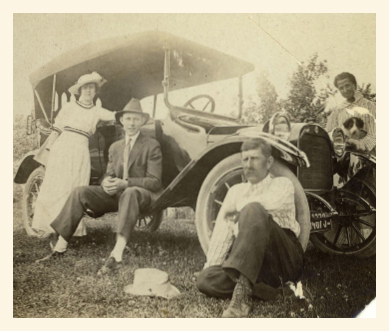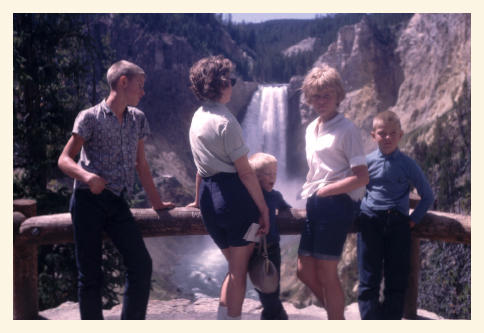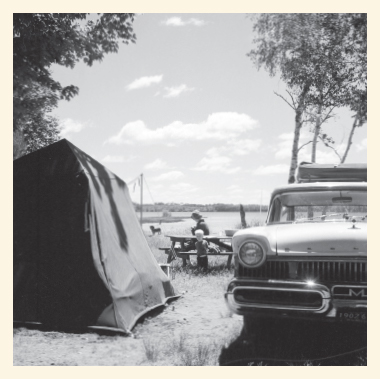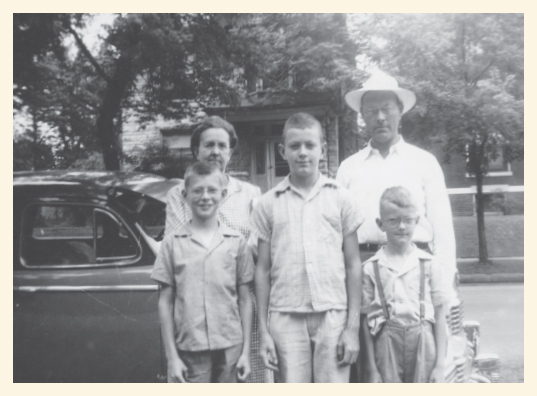By Eric Peterschmidt
Remember those days when you were young, and family – perhaps aunts and uncles or grandparents — were visiting? At some point, they all gravitated to the kitchen or dining room table and just talked. Initially, the conversation was likely about what each other’s families were up to, current events, maybe even politics or religion (Ohhh, boy!!).
However, it often evolved to reminiscing about what it was like when they were kids and the sharing of stories of what life was like back in the day. Maybe some old photos were passed around which triggered even more memories and stories. The conversation was full of laughter, tears, sometimes even anger depending on what emotions the memories provoked.
If you were like me, that was the conversation you enjoyed – being captivated as they shared their life stories – a storytelling practice that goes back thousands of years, when the kitchen table was just a campfire.
I was usually like a fly on the wall during those conversations. Not really participating, but listening, and hoping they would not tell me to go to bed. The ones I remember the most were the funny ones – and maybe it was just the sight of them laughing so hard they cried (and I never saw them cry!) that made it so impactful.
The stories were often about antics or trouble they got into. Sometimes they were a little off-color! I remember my dad talking about a play that his grade school class was doing. One of his classmates had the line, “That sheriff is a real smart-feller.” My onery dad saw an opportunity with that. For many days prior, he kept telling his classmate, “That sheriff is a real fart-smeller. That sheriff is a real fart-smeller.” When the play was held, and everyone’s parents were there to see their sons and daughters perform, my dad’s classmate did not disappoint (at least did not disappoint my dad) as, sure enough, he proudly recited, “That sheriff is a real fart-smeller!”
There were other stories too, about riding on the running boards of cars at a high speed, or their grandfather using way too much TNT to blow up a tree stump. Some were insightful about what times – especially hard times – were like.
For example, after my grandparents moved off the farm, they lived near some railroad tracks during the latter part of the Great Depression. There were often what, at that time, were called “Hobos” (homeless people) walking up and down the tracks, roaming from town to town by hopping empty box cars on freight trains. Even though my grandparents were not well-off, they knew they were in a lot better shape than many others, so my Grandma would feed them when they wandered by. However, she made it very clear to the kids to never ever invite them in the house!
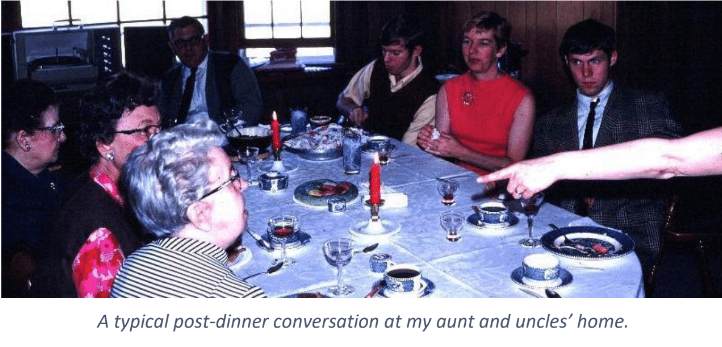
Food was a common subject. Amazing how resourceful they were on the farm and how much work it was for everyone. But still, many joyful memories. Like tapping the sugar maple trees, and the candy that would be made by throwing clumps of the syrup into the snow and letting it freeze.
They also enjoyed their leisure time – usually on Sundays. My grandfather and great grandfather loved to play games such as horseshoes and checkers on those days – after church while still dressed in their Sunday-best white shirts and ties.
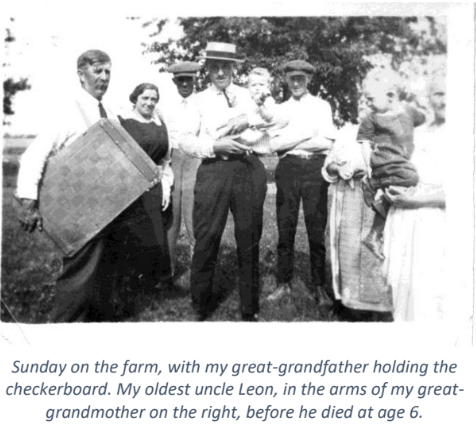 Some stories were sad, too. Like of my oldest uncle dying when he was 6 years old of brain cancer, and my grandma – his mother – never speaking of him again because it was, according to my aunt, too painful for her to do so.
Some stories were sad, too. Like of my oldest uncle dying when he was 6 years old of brain cancer, and my grandma – his mother – never speaking of him again because it was, according to my aunt, too painful for her to do so.
Other stories were so visual, you could almost see them. Like my grandma talking about this one Christmas on the farm as a little girl, riding to 5AM Mass in the back of a horse drawn sleigh on a clear moonlit night, with the light reflecting off the fields of snow. When they returned home, the sun was coming up, and it was the most beautiful sunrise she ever saw.
Were you as fortunate as I was to experience storytelling like that?
Back when I was a kid, it was not uncommon to have these gatherings. That was partially due to the fact that family members often lived close to each other. It was also, in part, out of tradition. Things like the “Sunday Dinner” just always happened. My mother-in-law was a case in point. She always had Sunday dinner with an open-door policy. If you were in Des Moines and you were family or friend, you were welcome at her home around noon on Sunday. She did that for decades, hardly ever leaving the kitchen until she was sure everyone was fed.
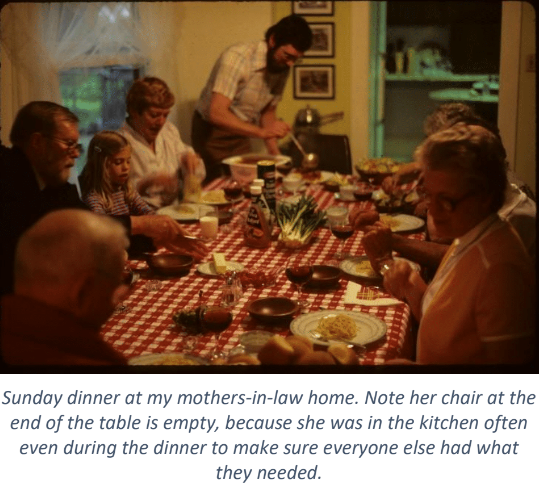 However, times change. Keeping those kitchen table conversations going has been challenging. This is not new – it has been going on for several decades. Families are more separated than ever, and things like the “Sunday Dinners” are the exception, not the rule. Heck – even just having a sit-down dinner with the family in your household can be difficult! Then, Covid happened and that made it even more challenging.
However, times change. Keeping those kitchen table conversations going has been challenging. This is not new – it has been going on for several decades. Families are more separated than ever, and things like the “Sunday Dinners” are the exception, not the rule. Heck – even just having a sit-down dinner with the family in your household can be difficult! Then, Covid happened and that made it even more challenging.
Covid has been a horrid experience for us all – the worst, of course, for those who have lost family members. As we start to come out of it, I think it is becoming clear that we are going to be a different society in some ways than we were on the way in. Some of those changes can be good! Out of the forced isolation we have all endured has come an increased respect for family, the love we share for each other, and how much we appreciate our time together.
What can we do with that renewed respect, while it is still fresh? I have a thought on that.
For all of human history, the stories told around that kitchen table have been oral history. Those stories, as amazing as they are, will erode with time and almost certainly disappear… unless something changes. So, my ask of all of you is to do something about it! Fortunately, we now have ways to capture those stories – ways that are easier than ever before.
Services like Zoom have shown us that, even when afar, we can still get together to laugh, cry and show that love. Zoom calls can also be recorded – preserving your family’s stories as told by the storytellers.
Another approach is to use photographs to trigger memories and stories. This is especially powerful when the person who knows the story is telling the story, and that story is connected to the photo. That’s the approach we use with TightKnit.
If nothing else, just turn on an audio or video recorder to get the raw material and archive it now for future use.
Remember too, that tomorrow’s history is happening today. You don’t have to wait until your aunts and uncles are gathered around the table. You can do it today with your kids. While they may not appreciate all of your stories today, if they are like most, someday they will look back on the time when they were kids, remembering what it was like to hear your stories.

